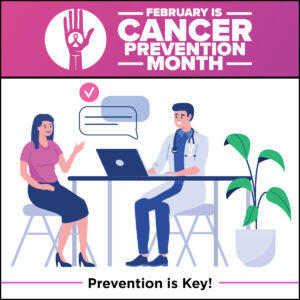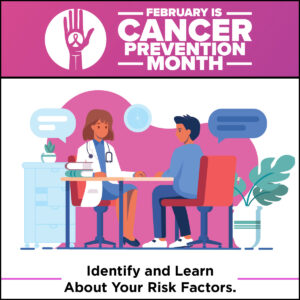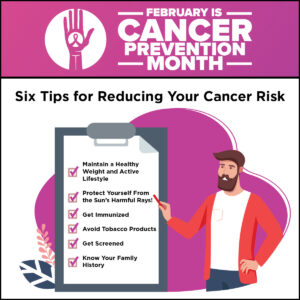 Prevention is Key!
Prevention is Key!
Did you know that 40% of all cancer diagnosed and nearly ½ of all deaths from cancer in the Unites States can be attributed to preventable causes?
Factors such as physician inactivity, obesity, smoking, and excessive exposure to the sun can all play their part. As a result, taking measures to quit smoking (or never start!), eating healthy and exercising regularly, taking precautions when you are exposed to sun, and even getting vaccinated against pathogens that can cause certain cancers can dramatically reduce your risk.
 Identify and Learn About Your Risk Factors
Identify and Learn About Your Risk Factors
Identifying the risk factors that may most directly affect you and your lifestyle, and talking to your healthcare provider about them, can help you better understand how to manage those risks, including making healthier lifestyle decisions to improve your overall health. Opening up to your doctor about your family history, your habits and daily routine, etc., will also help your doctor provide a better assessment of your risk, and determine if genetic testing or counseling may be right for you.
Some general risk factors for developing cancer may include:
• Family History of Cancer
• Using Tobacco
• Obesity
• Older Age
• Some Types of Viral Infections
• Specific Chemicals
• Exposure to Radiation
• Excessive Alcohol Use
Of course, some of these factors are things we can not control, but others are certainly within our ability to alter for the better.
 Six Tips for Reducing Your Cancer Risk
Six Tips for Reducing Your Cancer Risk
We all understand that there’s no guaranteed way to prevent cancer. However, there are certain risk factors that increase the likelihood of developing certain cancers, and for these items you CAN take action to potentially help lower your risks.
Making smarter, healthier lifestyle choices is a major factor. Getting regular or recommended screenings can also help to monitor conditions that could develop into something more serious. Participating in routine vaccinations against certain viruses can also play an important role in cancer prevention.
Here are a few tips to help!
Maintain a Healthy Weight and Active Lifestyle
- Eat foods that are more plant-based and lower in calories
- Limit processed meats
- Monitor and control your alcohol consumption
- Find a way to include physical activity in your daily routine
Protect Yourself From the Sun’s Harmful Rays!
- Stay out of direct sun during the peak times of the day
- If you do have to be exposed to sunlight during peak times, be sure to use sunscreen generously, cover exposed areas with hats or loose clothing, and find shade when you can
- Avoid tanning beds and sun lamps
Get Immunized
- Believe it or not, there are viruses out there that can cause or attribute to the development of cancer. There are vaccines that have been proven to be effective in helping to reduce certain cancer risks. For example:
– The HPV vaccine can greatly decrease the risk of cervical cancer, or cancers of the throat, tongue, anus and genitalia
– The Hepatitis B vaccine can help decrease liver cancer risk
Avoid Tobacco Products
- All forms of tobacco products have chemicals that damage our DNA
- NO forms of tobacco use are considered ‘safe’
- If you are a tobacco user, quit, or seek help from your doctor or counseling to help you quit
Get Screened
- Talk to your doctor about screenings that may be right for you. Regular health screenings and checkups can often help detect cancers early, when treatment may be more successful.
Know Your Family History
- Up to 10% of cancers are genetically inherited
- Being knowledgeable about your family history can help guide the conversation with your primary care provider when it comes to considering screenings, lifestyle changes, or counseling
The bottom line is that cancer waits for no one, so there’s no reason not to take the precautions you can NOW. Ask your primary care provider for guidance, helpful tips and prevention strategies.
Sources: AACR, Cancer Network


